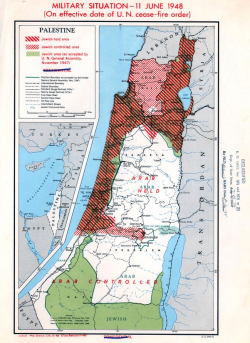Challenger
Gold Member
Challenger, et al,
This is nonsense.
(COMMENT)It was the collective decision of the Arab League to use of force against the territorial integrity or political independence of any state (external interference). A violation of the Article 2(4) Principle of the UN Charter.
Except it wasn't. The Arab league intervened, "...by virtue of their responsibility as members of the Arab League which is a regional organization within the meaning of Chapter VIII of the Charter of the United Nations. The recent disturbances in Palestine further constitute a serious and direct threat to peace and security within the territories of the Arab States themselves. For these reasons, and considering that the security of Palestine is a sacred trust for them, and out of anxiousness to check the further deterioration of the prevailing conditions and to prevent the spread of disorder and lawlessness into the neighbouring Arab lands, and in order to fill the vacuum created by the termination of the Mandate and the failure to replace it by any legally constituted authority, the Arab Governments find themselves compelled to intervene for the sole purpose of restoring peace and security and establishing law and order in Palestine.
The Arab States recognize that the independence and sovereignty of Palestine which was so far subject to the British Mandate has now, with the termination of the Mandate, become established in fact, and maintain that the lawful inhabitants of Palestine are alone competent and entitled to set up an administration in Palestine for the discharge of all governmental functions without any external interference. As soon as that stage is reached the intervention of the Arab States, which is confined to the restoration of peace and establishment of law and order, shall be put an end to, and the sovereign State of Palestine will be competent in co-operation with the other States members of the Arab League, to take every step for the promotion of the welfare and security of its peoples and territory." Arab League Declaration on the intervention in Palestine, 15 May 1948 | Religion :: Science :: Peace
All you have to do is merely read UN Security Council Resolution 50, THEN the UN Security Council Resolution 54, to make the determination.
UNSC RES/50 declares in para 11 that "rejected by either party or by both, or If, having been accepted, it is subsequently repudiated or violated, the situation in Palestine will be reconsidered with a view to action under Chapter VII of the Charter of the United Nations." THEN read UNSC RES/54, and you will notice that is says: "Taking into consideration that the Provisional Government of Israel has indicated its acceptance in principle of a prolongation of the truce in Palestine that the States members of the Arab League have rejected successive appeals of the United Nations Mediator, and of the Security Council in its resolution 53 (1948) of 7 July 1948, for the prolongation of the truce in Palestine; and that there has consequently developed a renewal of hostilities in Palestine. Israel accepted the Truce and the Arab League did not.
I agree that the Arab League used the compelling reason of self-defense (sole purpose of restoring peace and security and establishing law and order), BUT that merely attempts to color the issue. Jordan advanced across their borders to claim the West Bank, while Egypt claimed the Gaza Strip. the real truth was, the League jumped their borders to steal land, which the did and held for two decades.
You can pump-out that disinformation all you want. The fact is, that after using the "restoring peace and security" excuse --- they captured territory that was allocated for the Arab State.
Most Respectfully,
R
The fact is, that "after using the "restoring peace and security" excuse --- they captured territory that was allocated for the Arab State" in order to prevent it falling into the hands of the Zionists (or Abdullah, which was both Syria's and Iraq's primary objective).
The fact that Jordan's Abdullah had already agreed to divide Palestine between the Zionists and himself is irrelevant as regards the intention of the Arab intervention in Palestine. It puts paid to the myth that the Arabs were agressors and intended to "drive the Jews into the sea" or that at any point there was an existential threat to Zionist Israel.
Interesting that the UNSC did not condemn the Arab intervention as agression and the fact that this was two months following the original intervention. Neither do the UNSC resolutions you mention or cite Article 2 (4) of the Charter which indicates the UNSC did not consider the Arab intervention a violation of said article.
As an aside, I wonder who murdered the UN mediator mentioned in the UNSC resolutions in order to prevent him carrying out his function?


